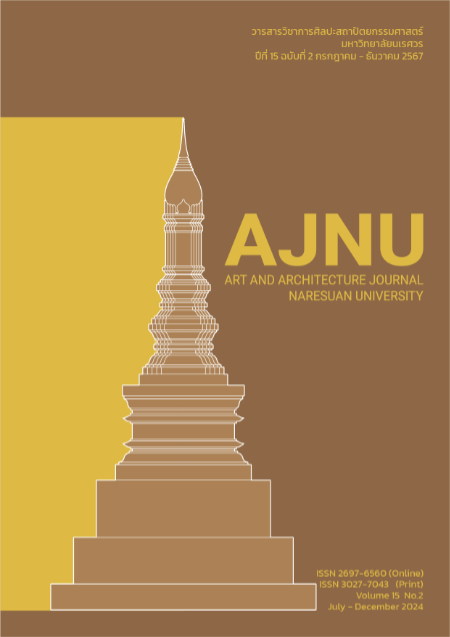Modular clothing : ideas from the past to the fashion of the future
Main Article Content
Abstract
Modular Clothing Design for Sustainable Fashion advances the study of attachments in the fashion industry. Closure is a method that helps to attach, cling, bind, and assists in opening and loosening. Used for costumes, modular apparel refers to clothing that has a modular system design. Garments can be disassembled and reattached to original or different positions by using a variety clothing fasteners. By benefiting the needs of the wearer, modular clothing benefits humanity in many ways: functionality to meet basic human needs, aesthetics and sustainability. This article aims to study the origins of modular clothing, analyze the relationship of modular concepts with examples of past costumes and understand the apparel fabrication process related to a modular concept. So far, analysis of current modular clothing structure by type, description and comparative methods, along with illustrations, have shown that costumes in the past had employed modular thinking. Tailor-made construction methods are consistent with the modular sustainability principle. Currently, sustainability has promoted modular fashion with greater variation. It also found that there are three types of modular clothing structures: separate component structure, geometric structure, and compound structure. Effective modular clothing must have good elements: form, ease of use, and an efficient connective systems. These necessary elements can serve as a guideline for further development of research guidelines in the design of sustainable clothing attachments in the fashion industry.
Article Details

This work is licensed under a Creative Commons Attribution-NonCommercial-NoDerivatives 4.0 International License.
References
ธรรมธรรศ เลี้ยงธรรมรัตน์. (2562).การพัฒนาและออกแบบเครื่องแต่งกายแฟชั่นจากวงจรชีวิตเครื่องแต่งกายแฟชั่นอย่าง
ยั่งยืนด้วยทฤษฎีระบบโมดูล่าร์ (ศป.ม.), มหาวิทยาลัยศรีนครินทรวิโรฒ, กรุงเทพ.
Carolin Vogler. (2017). Modular Fashion. สืบค้นเมื่อ 7 มกราคม 2566. จาก https://medium.com/
@CarolinVogler/modular-fashion-c98306c820a9
Chanjuan Chen and Kendra Lapolla. (2020). The Exploration of the Modular System in Textile and Apparel
Design. Clothing and Textiles Research Journal , 39(1) ,1-16.
Fabian Gorsler. (2022). Gauvain’S Highly-Modular Jacket Makes Shopping Fun. Retrieved December 5, 2022,
from https://www.highsnobiety.com/p/gauvain-modular-jacket/
Fashion History Timeline. (2017). 1460-1469. สืบค้นเมื่อ 11 กุมภาพันธ์ 2566 จาก
https://fashionhistory.fitnyc.edu/ 1460-1469/
Fashion History Timeline. (2017). Ruff. Retrieved February 11, 2023, from https://fashionhistory.fitnyc.edu/ruff/
Harita Kapur. (2016). Handmade Tales: Sustainable Fashion Through Craft Connections MDes., Massey
University, Wellington.
Hennessy, K., ed. (2012). Fashion the Definitive History of Costume and Style. New York : DK Publishing.
Jess Peter. (2021). Transformable Fashion: The Biggest Sustainable Clothing Trend That Never Was. Retrieved
January 8, 2023, from https://www.fashionstudiesjournal.org/longform/2018/9/15/transformable-fashion
Meng-Mi Li, Ying Chen, Ye Wang. (2018). Modular Design in Fashion Industry. Journal of Arts & Humanities.
Volume 07, Issue 03, 2018, (27-32) https://theartsjournal.org/index.php/site/article/view/1271/644
Pattida Sothornprapakorn. (2560). เจ๋งง่ายๆ ด้วยระบบ Modular./Neverland Effects.จาก : https://www. neverland
effects.com/howto/%E0%B9%80%E0%B8%88%E0%B9%8B%E0%B8%87%E0%B9%84%E
%B8%94%E0%B9%89%E0%B8%87%E0%B9%88%E0%B8%B2%E0%B8%A2%E0%B9%86%E0%B8%
%E0%B9%89%E0%B8%A7%E0%B8%A2%E0%B8%A3%E0%B8%B0%E0%B8%9A%E0%B8%9A-
modular/
PAUL T. Anastas, Julie B. Zimmerman.Through the 12 Principles Green Engineering. (2003). Environmental
Science & Technology. American Chemical Society Retrieved January 13, 2023, from


